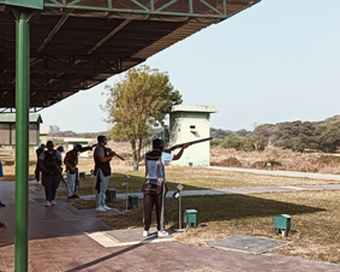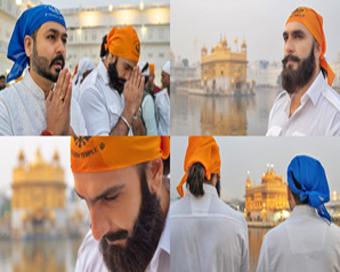Gallery
 PM Modi visit USA
PM Modi visit USA Only the mirror in my washroom and phone gallery see the crazy me : Sara Khan
Only the mirror in my washroom and phone gallery see the crazy me : Sara Khan Karnataka rain fury: Photos of flooded streets, uprooted trees
Karnataka rain fury: Photos of flooded streets, uprooted trees Cannes 2022: Deepika Padukone stuns at the French Riviera in Sabyasachi outfit
Cannes 2022: Deepika Padukone stuns at the French Riviera in Sabyasachi outfit Ranbir Kapoor And Alia Bhatt's Wedding Pics - Sealed With A Kiss
Ranbir Kapoor And Alia Bhatt's Wedding Pics - Sealed With A Kiss Oscars 2022: Every Academy Award Winner
Oscars 2022: Every Academy Award Winner Shane Warne (1969-2022): Australian cricket legend's life in pictures
Shane Warne (1969-2022): Australian cricket legend's life in pictures Photos: What Russia's invasion of Ukraine looks like on the ground
Photos: What Russia's invasion of Ukraine looks like on the ground Lata Mangeshkar (1929-2022): A pictorial tribute to the 'Nightingale of India'
Lata Mangeshkar (1929-2022): A pictorial tribute to the 'Nightingale of India' PM Modi unveils 216-feet tall Statue of Equality in Hyderabad (PHOTOS)
PM Modi unveils 216-feet tall Statue of Equality in Hyderabad (PHOTOS)India Open Competition in Shotgun, organised by the National Rifle Association of India (N
- Hockey India names Amir Ali-led 20-man team for Junior Asia Cup
- Harmanpreet Singh named FIH Player of the Year, PR Sreejesh gets best goalkeeper award
- World Boxing medallist Gaurav Bidhuri to flag off 'Delhi Against Drugs' movement on Nov 17
- U23 World Wrestling Championship: Chirag Chikkara wins gold as India end campaign with nine medals
- FIFA president Infantino confirms at least 9 African teams for the 2026 World Cup
How PM Modi and his 11 expert teams work round the clock to save India from corona Last Updated : 01 Apr 2020 12:45:57 PM IST 
Prime Minister Narendra Modi (file photo) Determined to contain the dreaded virus from spreading in the community, Prime Minister Narendra Modi and his big team of experts are working tirelessly to monitor minute-to minute development of any happening related to the pandemic in the country. From the announcement of the 21 day lockdown to various key strategies of preventing community transmission in the world's second most populated country, PM Modi's decisions are based on massive research and collective opinion of top experts.
Amid the unprecedented crisis of COVID-19 outbreak, Prime Minister Modi has stretched his working schedule to 17-18 hours, often working through night till 3 a.m. or even more."Series of meetings go on through the middle of the night, as the PM vigorously reviews implementation of decisions taken by various high-level groups constituted to effectively control the pandemic," highly-placed sources informed IANS.Besides holding frequent video conferencing from his camp office at 7, Lok Kalyan Marg and consulting key Cabinet Ministers on a daily basis, PM Modi works tirelessly with 11 dedicated teams of experts which includes doctors, bio-scientists, epidemic experts, and economists, each working as separate group.Top sources in the PMO revealed that presently the PM is more focussed on Emergency Medical Management Plan. The team looking after this plan is led by Dr V Paul, member of the NITI Aayog and coordinated by Modi's aide Rajendra Kumar, a director level officer in the PMO. These groups feed into the core group assisting the PM which in turn disseminates vital information to him.Another area which concerns the PM is disease surveillance, testing and setting up hospitals and quarantines. This important team which includes AIIMS Director Randeep Guleria and ICMR's top epidemic expert Dr Raman Gangakhedkar is headed by C.K. Mishra Secretary, Ministry of Environment and Forest and Climate Change.Prevention of coronavirus in India largely depends on this crucial team.PM Modi has kept two of his trusted PMO officials, Shrikhar Pardeshi and Mayur Maheshwari in this team."Modiji keeps a close tab on the number of people being tested (and its outcome) and also on the increase in number of cases of COVID-19. He seems determined in his endeavour to prevent the virus from spreading into large communities," says an official, a member of one of the 11 groups constituted to fight the pandemic.While these core groups keep updating crucial information to PMO, Modi's Principal Secretary P.K. Mishra remains in constant touch with experts.He is assisted by two senior bureaucrats, Tarun Bajaj a 1988 batch IAS officer from Haryana cadre working with the PM since last 5 five years, and A.K. Sharma, a trusted officer of Modi from his Gujarat days."Most of the meetings and exchange of notes takes place between Mishra and the experts of different groups. However if some crucial points are to be discussed or any important decisions are to be urgently taken, it takes just a few minutes for Mr Modi to join the conversation," a source revealed, adding: "Everyone of us do adhere to social distancing. Even senior ministers follow the norm of safe distance while talking to the PM."In an outbreak of a pandemic at such a large scale, seen as the worst in the last 100 years, the Prime Minister realises the contribution of the private sector, NGOs, international organisations and relief related social groups.A special team to coordinate with NGOs and the private sector has been working round the clock under Amitabh Kant, CEO of Niti Aayog. Gopal Bagley, a joint Secretary in the PMO, is coordinating with Amitabh Kant to mobilise the NGOs and leading companies in raising funds and also organising relief work on the ground at a bigger scale.Several big corporate houses from Tatas, to Reliance and Bharti to Adani group have contributed major amount for the PM Cares fund. The private sector, with the help of leading NGOs, have also teamed up with state governments and local administration in providing food and shelter to the poor across India.The role of the media also plays a vital role in prevention of such dreaded viral disease. Taking time out from his packed schedule these days, the PM recently interacted with top media barons, including editors of TV channels and newspapers. He also held video-conference with radio jockeys to spread the message of people fight against the pandemic.On bringing awareness on the 'dos and don'ts' on spread of COVID-19, the social media team of PMO led by Hiren Joshi works round the clock. PM Modi himself suggests of uploading useful messages for people staying at home during the 3-week long lockdown.Idea of uploading various Yoga asanas on the PM's Twitter account was welcomed across party lines.The Prime Minister also revealed about practising Yog Nidra, which allows the body to relax and reduces stress.Sources said that coming two weeks would be crucial as experts hope that if all goes well with the lockdown, a rise in temperature by the end of April may also help in fighting the dreaded virus.IANS New Delhi For Latest Updates Please-
Join us on
Follow us on








172.31.16.186







